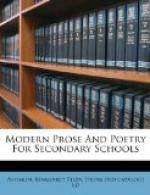on the ground,
Then onward I sped in the battle, the even-contested battle,
Till late in the night reliev’d to the place at last again I made
my way,
Found you in death so cold dear comrade, found your body,
son of responding kisses (never again on earth responding),
Bared your face in the starlight, curious the scene,
cool blew the moderate night-wind,
Long there and then in vigil I stood,
dimly around me the battle-field spreading,
Vigil wondrous and vigil sweet there in the fragrant silent night,
But not a tear fell, not even a long-drawn sigh, long, long I gazed,
Then on the earth partially reclining sat by your side
leaning my chin in my hands,
Passing sweet hours, immortal and mystic hours with you dearest
comrade—not a tear, not a word,
Vigil of silence, love and death, vigil for you my son and my soldier,
As onward silently stars aloft, eastward new ones upward stole,
Vigil final for you brave boy, (I could not save you, swift was
your death,
I faithfully loved you and cared for you living,
I think we shall surely meet again,)
Till at latest lingering of the night, indeed just as the
dawn appear’d,
My comrade I wrapt in his blanket, envelop’d well his form,
Folded the blanket well, tucked it carefully over head and
carefully under feet,
And there and then and bathed by the rising sun, my son in his grave,
in his rude-dug grave I deposited,
Ending my strange vigil with that, vigil of night and battlefield dim,
Vigil for boy of responding kisses (never again on earth responding),
Vigil for comrade swiftly slain, vigil I never forget,
how as day brighten’d,
I rose from the chill ground and folded my soldier well in his blanket,
And buried him where he fell.
SUGGESTIONS FOR STUDY
What is a vigil? Was Whitman ever in battle? Does he mean himself speaking? Was the boy really his son? Is the man’s calmness a sign that he does not care? Why does he call the vigil “wondrous” and “sweet”? What does he think about the next life? Read the poem over slowly and thoughtfully to yourself, or aloud to some one: How does it make you feel?
Can you see any reason for calling Whitman a great poet? Has he broadened your idea of what poetry may be? Read, if possible, in John Burroughs’s book on Whitman, pages 48-53.
EXERCISES
Re-read the Warble for Lilac-Time. Can you write of the signs of fall, in somewhat the same way? Choose the most beautiful and the most important characteristics that you can think of. Try to use color-words and sound-words so that they make your composition vivid and musical. Compare the Warble for Lilac-Time with the first lines of Chaucer’s Prologue to the Canterbury Tales. With Lowell’s How Spring Came in New England.




